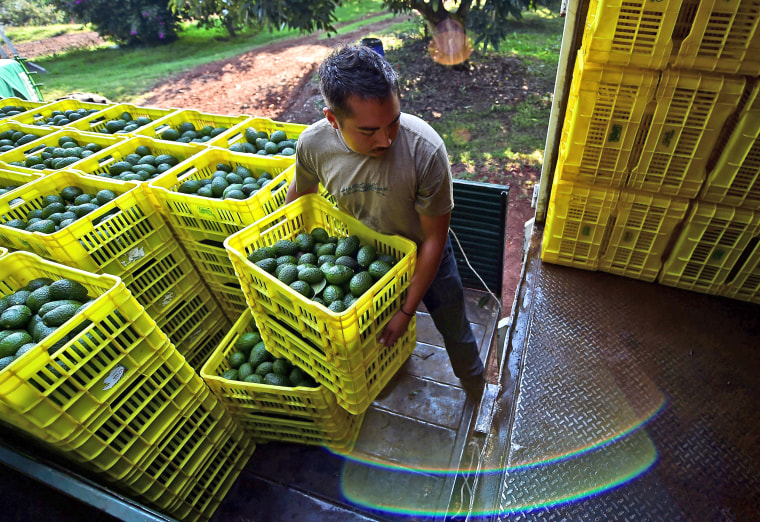American consumers would pay a hefty price if President Donald Trump carries out his latest tariff threat against Mexico — but that’s just one of many issues created by the president’s pledge to impose tariffs of up to 25 percent on one of the country’s largest trading partners.
Trump said via tweet on Thursday he would impose tariffs of 5 percent on all Mexican imports beginning June 10 in response to the flow of migrants over the southern U.S. border. A subsequent White House statement said the tariffs would rise incrementally up to 25 percent by Oct. 1 unless Mexico “substantially stops the illegal inflow of aliens coming through its territory.”
The uncertainty caused financial markets to plummet and threatened to send stocks lower for the sixth week in a row. “This is just the latest worry to put on the fire for investors,” said Ryan Detrick, senior market strategist for LPL Financial. “Can we really fight two trade wars at the same time?”
The prospect of fighting trade wars on multiple fronts spooks investors and executives alike.
“As we are all fighting to develop plans to exit or to reduce our exposure to China, one of our options — Mexico — is now equally in jeopardy,” said Rick Helfenbein, president and CEO of the American Apparel & Footwear Association.
“This could roil U.S. and global financial markets, which could see this as a signal that Trump is leading us in the direction of a global trade war. If that were to happen, the U.S. economy could get hit hard,” said Desmond Lachman, resident fellow at the American Enterprise Institute, a right-leaning think tank.
From a consumer perspective, everything from cars to vegetables would get more expensive. The U.S. imports $53 billion worth of autos from Mexico, and the country also is a major supplier of produce, electronics and apparel, including more than one-third of men’s and boy’s jeans, according to Helfenbein.
“Prices will go up, sales will go down, jobs will be lost,” he said. “This has a devastating effect on our industry.”
“A lot of companies in the U.S., not just retailers, treat North America as a unified market,” said David French, senior vice president of government relations at the National Retail Federation. “It opens a new front in uncertainty for retailers, but really, for the U.S. economy.”
“President Trump's attempt to bully Mexico has horrified U.S. businesses as well as Mexican political leaders,” said Ian Shepherdson, chief economist at Pantheon Macroeconomics. “We expect the market to keep falling until the president blinks.”
Lachlan estimated that a 25 percent tariff on all Mexican imports could add 0.4 percent to inflation. But even more than just the health of the economy is at stake.
“It borders more on the crazy,” Bill Daley, former U.S. Secretary of Commerce under President Bill Clinton, said on CNBC’s Squawk Box on Friday, characterizing Trump’s Mexico tariff threat as “throwing gas on a fire.”
“The really shocking thing about this from a political standpoint is this is an abrupt reversal of everything the administration has been signaling about its top legislative priority,” said Phil Levy, senior fellow on the global economy at the Chicago Council on Global Affairs.
Levy pointed out that on Thursday, U.S. Trade Representative Robert Lighthizer asked Congress to begin the ratification process for the United States-Mexico-Canada Agreement (USMCA), Trump’s replacement to the North American Free Trade Agreement. The Office of the U.S. Trade Representative has called the trade pact “a mutually beneficial win for North American workers, farmers, ranchers, and businesses” that would create a more level playing field for American exports.
Now, its passage is in jeopardy. Although acting White House Chief of Staff Mick Mulvaney told reporters on Thursday, "The two are absolutely not linked," and said, “These are not tariffs as part of a trade dispute,” experts disagree, saying Trump absolutely risks derailing the pact.
Slapping tariffs on Mexico would almost certainly be deemed illegal under World Trade Organization rules. Trade experts on both the right and the left say this is alarming because it sends a message to all U.S. trading partners that the president has no compunctions about breaking treaties, even ones he orchestrated.
“It’s a clear signal the president does not feel bound by trade agreements,” Levy said.
As the threat of a full-on trade war with China grows, Beijing is more likely to dig in if its trade negotiators believe Trump would extract concessions in order to make a deal, only to turn around and break his word.
“In the eyes of the outside world, this means that the U.S. is now the world's biggest rogue trader,” Shepherdson said. This has far-reaching implications that could leave the U.S. with a tarnished reputation on the global stage well after Trump’s presidency is over, a legacy that could take a long time to overcome.
“This action would further undermine the rule-based international trade system that the U.S. so painfully put together in the post-war period,” Lachman said.
“Does this seem like the extent of the trade problems we’re going to have?” ” Levy said. “This says no, we’re going to pick trade wars anywhere there’s something that annoys the president.”
